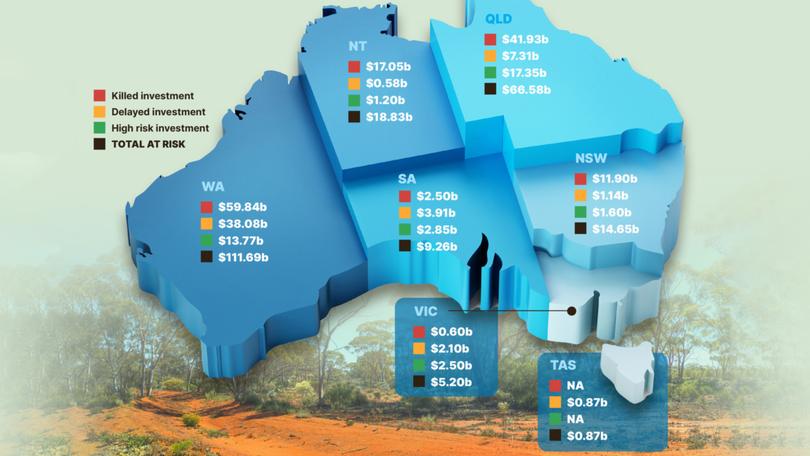Nature Positive: Eye-watering cost of climate trigger revealed in research from conservative think tank IPA
A climate trigger would put more than $220 billion worth of economic investment at risk, according to new research from conservative think tank IPA.

A climate trigger would put more than $220 billion worth of economic investment at risk, according to new research being used to pressure Prime Minister Anthony Albanese to explicitly rule out adding it to Labor’s shakeup of environmental laws.
WA would be the hardest hit State, losing almost $112 billion in spending, analysis from conservative think tank Institute of Public Affairs found.
Miners are fearful the Federal Government could cave to the Greens and adopt a climate trigger in order to get the next tranche of its Nature Positive Plan through Parliament.
Sign up to The Nightly's newsletters.
Get the first look at the digital newspaper, curated daily stories and breaking headlines delivered to your inbox.
By continuing you agree to our Terms and Privacy Policy.Labor has not given any indication publicly that it is willing to do so, confident it already has a tool to regulate emissions from major projects via the revamped safeguard mechanism.
But the industry, headed by the Business Council of Australia and Minerals Council of Australia, remains wary and has become increasingly vocal in recent weeks about the threat a climate trigger would pose to the economy.
The new IPA research is the first to put a dollar figure on the potential economic cost, calculating the emissions-cutting policy would prevent $227.1 billion of investment flowing into the Australian economy.
The analysis applied the Greens’ 2022 climate trigger model, which would ban developments with more than 100,000 tonnes of annual greenhouse gas emissions and require those with between 25,000 and 100,000 tonnes to be assessed under the EPBC Act, to proposals on the Office of Chief Economist’s 2023 major projects list.
The analysis found 344 projects that are either in the construction or approvals pipeline would be captured.
More than $133 billion worth of investment would be “killed” outright — including $59.8 billion in WA — because the projects breached the 100,000 tonnes threshold, according to the analysis.
A further $54 billion would be delayed as the projects would need to clear EPBC assessment.
The remaining $39.2 billion was for projects that don’t have emissions data but are considered “high risk” because they are coal, oil or gas developments.
Saxon Davidson, a research fellow at the IPA, said the demands for a climate trigger presented a challenge for Mr Albanese.
“This is an important moment for the Prime Minister, will he acquiesce to the demands of inner-city Teal and Greens activists, or will he stand up for the jobs and wealth creation in our vital resources sector?” Mr Davidson said.
“Regional Australia is the lifeblood of our prosperity and cannot be sacrificed for a cheap political deal with inner-city Greens or teals.”
Greens environment spokeswoman Sarah Hanson-Young this week reaffirmed the party’s goal to add a climate trigger to federal nature laws.
Senator Hanson-Young said the resources sector’s “alarmism” in recent weeks showed its campaign was working.
